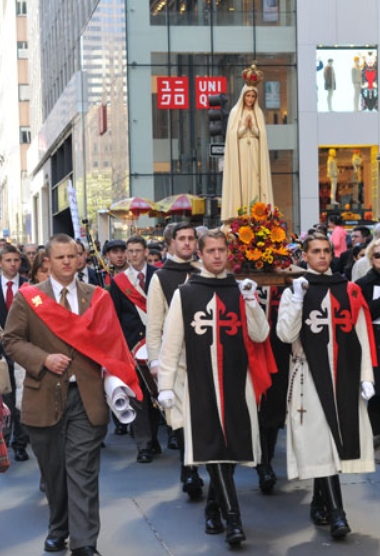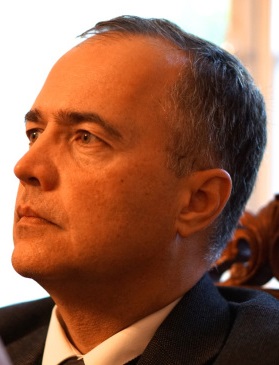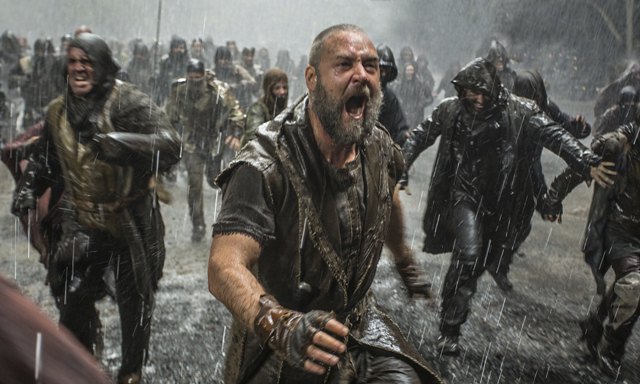Ideas are for Action as the Bow is for the Arrow
I had the honour of being with Prof. Plinio Corrêa de Oliveira, founder of the Societies for the Defense of Tradition, Family and Property, during the last 8 years of his life. I was struck by his way of acting with depth and effectiveness in society. He always defined himself as a person of action but only after prayer and contemplation.
♣
Before moving on, I imagine the indignant faces of some readers. “Prayer? But if that is a waste of time!” The counter-revolutionary understands the need for action, but very few realize that prayer is a form of necessary reflection. I recall Prof. Oliveira’s words:
Nada hay más práctico que las ideas, porque ellas son para la acción, loque el arco es para la flecha.
(nothing is more practical than ideas, because they are for action, what the bow is for the arrow).
We get used to seeing the same problem from different angles all the time. A person can pray the Pater Noster every day, and always have something different to meditate on. Thanks to this form of contemplation and reflection, people of Catholic faith can approach the problems of others in a more profound sense because they appreciate their urgencies in a more personal way. When Man suffers internal conflicts of a moral, ethical or philosophical nature, he will do better to present them to a priest, and not to a specialized engineer, who, however good he may be, will have difficulty understanding them on the necessarily deeper level. Given that Man is more than just a technical being, the problems he faces can rarely be solved by technical means.

Plinio Corrêa de Oliviera, founder of the counter-revolutionary organization “Tradition Family Property”
Prayer, therefore, is certainly not a waste of time, it is a necessary stage of contemplation before right action is taken. Asking God – who represents the paradigm of the ultimate good – to intervene in the struggle is wise. But let’s now return to the question of action.
I have met many conservative groups throughout my life and activism in Europe, South America and Australia. Some progressed and are increasingly flourishing. Others, have stalled and do not seem to grow, and many others have simply disappeared. Why accounts for the failure? The reasons are many, but in general they can be broken down into the lack of thought and lack of action, and some cases, for a fatal lack of both.
Broadly speaking, to start a movement you need a person with a leader’s charisma, gravitas and authority. It is not enough to see that there is a problem and want to fight it. You have to know how to attract the right people, how to motivate them so that the movement is a healthy organisation with a common purpose. Because people have different personal characteristics, a competent leader must know how to inspire each one in a way that is personally relevant, so he or she devotes as much time as possible to the common struggle. You have to analyze the opponent, and think how to defeat him from a multitude of different perspectives. Then, you have to know how to get the resources to act. And, finally, you have to have the courage to act in the face of the adversity’s expected criticisms, slander and persecution. Not everyone has these capabilities. But society is continuously producing leaders of some sort, be it in schools, in neighborhood associations, in private and public life, and these people, once they become aware of a problem, and once they are appropriately activated, can put into operation the natural gifts they have inherited and cultivated.
The first problem they face is, curiously, that another person who does not have those charisms, believes himself capable of directing the fight against the adversary. Many well-intentioned groups fail at the beginning because there are always envious people to whom it seems that the second place is not sufficiently prestigious. These types exist in all spheres of public and private life and their proliferation breeds a culture of vicious opportunism. In our side of counter-revolutionary activism, we have witnessed them create an internal tension that destroys conservative associations instead of promoting their mission. Of course this problem exists in all human associations, also among our adversaries. It is, sadly, part of the human condition that we must be constantly wary of.

Father and Mother at “Manif pour Tout” rally, Paris, France, 2016.
Let’s say that the leader manages to gather around himself a group of friends with the same motivating principles, as well as others who support a common cause and accept him as a leader. What is he to do now? Some fall into the temptation to do something immediately, without preparation. There is an urge to “do something” and do it now. They make the mistake of a general who goes into battle without a properly thought out and tested plan, without studying the adversary, and without having the slightest idea what to do should the unexpected occur, or should his forces be erased from the map at the first opportunity.
Some conservative groups begin to act everywhere, with great enthusiasm but without any strategy. They are a species of butterflies that always fly, but without any definite direction. After some time the futility of their action, opportunistic and inconsequential, is evident and they lose their initial enthusiasm. These are the associations that live briefly and disappear at the first sign of defeat.
I urge that the first thing to do is always to study the situation that you confront, your adversary, his tactics, and contemplate the reason why he is successful. In the vast majority of cases, the opponents of Christian Civilization succeed by means of deceit, falsehoods, corruption and buying traitors among their opposition. The first lesson the countr-revolutionary should learn is therefore this: to expect an honest and gentlemanly struggle from them is naïve, and a complete waste of time. Likewise, it is no secret to the members and friends of Tradition Family and Property as well as the Sydney Traditionalist Forum that in many parties that call themselves “conservative” there are people who are dedicated to “preserve” the triumphs of the Progressive Left. Take Spain as a recent example. The party that conservatives ordinarily put their trust in had the opportunity to eliminate abortion. This it had promised to do during its campaign, but until now it has done nothing. How else can a conservative elector see this but a betrayal by a leadership that can do nothing but “conserve” the achievements of the far left? This lack of willingness to act on the promises made to the people may naturally give rise to the question: is it the case that some people entered the party to do precisely nothing to promote the conservative cause? The communist revolutionary Lenin, perhaps the most successful revolutionary of last century, suggests an answer when he declared that “communism will bring anti-communism. Let us do anti-communism ourselves before the adversary does.” How are we to understand this seeming contradiction? It simply means this: to make sure that the agenda survives attacks from opponents, the left seeks to control the attack but owning it first. The result is that the left owns the framework of the critique that is used against it. If this is not what we are witnessing among the leaders of the conservative parties of the world, then the only other answer is that they are chronically incompetent in what they do. Either they are infiltrated by corrupt leadership, or they are simply stupid. Whatever the answer may be, the diagnosis is not flattering.

Antonio Francesco Gramsci, communist pioneer of Culture War infiltration of the establishment.
If we do not study the adversary, we enter the battle like a blind man in a shooting. Only by chance will we get to harm the enemy, and most likely we will be eliminated before achieving anything of benefit. But there is no need to rediscover the wheel. We do not need years of specialized studies. The number of conservative groups eager to share what they have learned over the years seems to be multiplying and more people appear to be willing to listen to our message. These groups are no longer just online. They hold congresses, more frequently and with more numerous attendees, and they have already developed innovative techniques to win public opinion.
Perhaps the most popular and widely networked congresses are those of the Pro-life groups. In Europe at least, these congresses are multiplying, and they are getting younger people from countries that until now had no broad scale activism in matters relating to bio-ethics and traditional morality. Networking is extremely important here because it allows activist from across the continent to recount their experiences, whether they are victorious or not. These lessons can then be taken back when they return to their country and new skills and strategies that have been shared and learned can then be put into practice.
Another example is the growing network of lawyers whose objective is to defend conservative people who are persecuted through “lawfare” by being taken to court by demolishers of Christian Civilization. The Ordo Iuris Association is pioneering this in Poland. It began with the visit of a French lawyer who had organized together with Spanish and Italian colleagues a group of lawyers who would provide their legal defence services pro bono every time a Pro-life person was brought to court. A trial can end the professional life of any person who is an activist on the Pro Life side of politics. Not only can the trial be highly defamatory but the costs associated with funding a legal defence, to pay the lawyers even if he wins the trial, is often impossible to meet. The abortionists and others on the cultural left have as a method to take conservatives to court, which can bankrupt an individual and leave him or her without the energy to go on; others who see this happen are scared and feel it is better not to challenge the status quo. It was a necessary and highly effective way to fight against the intimidation of conservatives. and the creation of the Ordo Iuris Association was a significant step towards taking the fight to the left. After initial success, the Association added other issues to its cause, such as presenting pro-life laws in parliament, and taking the to court those who attacked or insulted conservatives.
Another example of morale boosting and practical assistance between conservative associations are the Marches for life in different countries. The time is over when only the left paraded. Now, in Europe, it is the conservatives who go to the streets. A particularly reactive region at the moment is Central America, where, for example, a few days ago there was a gigantic march in Costa Rica against abortion and the so-called homosexual “marriage”. Associations that have related missions, local and overseas, go to the marches as well, give advice on how to better organize street activism, which strategies are more efficient, who to invite to talk, and so forth.

Marching during Poland’s “Rosary to the Borders” crusade, 2017.
Thus, advice on theory is combined with the practicalities of activism. It is true that the situation in each country has specific characteristics, and what works in one country will not necessarily work in another. But in a globalized world the problems faced by counter-revolutionaries are converging, and for that reason suggested solutions and strategies that have been applied by conservative groups can also be compared between jurisdictions.
Consider the “Rosary in the borders” campaign held in Poland, which mobilized a million people, in October of this year. Europe is increasingly being invaded by economic refugees, who are invited by irresponsible authorities who dream of the Utopia of a world without borders under a universal republic. For Polish conservatives this is naturally a big problem because it is happening right on the border of the country, and tremendous pressure has been placed on Warsaw to follow the same suicidal policies that are promoted by the elites in Berlin and Brussels. Any attempt to oppose this invasion is therefore attacked as being “racism”, “hatred” and other insinuations are made about an alleged “facistoid” tendency in the current of Law and Justice government. But two gentlemen, leaders of a group called “God alone is enough” planned a nation-wide spectacle that called people to show their displeasure by going to pray a rosary on all the borders of Poland. The idea was like a spark that set fire to society. The beaches were filled with people in prayer, many climbed the mountains (where they sometimes found groups of neighboring countries who also came to pray), others boarded boats to pray in the border rivers, and there was even a plane that ran through the borders with two pilots praying the rosary. No one can say that praying is a violent act of “hate”, or of “racism”. That accusation would be ridiculous. The campaign was a spectacular success which was reported throughout the global press, and which inspired other groups in Europe to hold similar events. Most importantly, it allowed Polish people to show its radical discontent with the suicidal policies being impose from their Western European “partners”.
Where courageous leadership is shown in one quarter, others follow. In Ireland, some 30,000 people gathered along its coasts to also pray for the preservation of Irish culture, including the rejection of abortion, and the defense against uncontrolled immigration. There is already talk of doing similar things in the United States and other countries as well.

Patriotic March during Poland’s Independence Day celebrations, Warsaw, 11 November 2017.
Another point that should be highlighted is the need to make coalitions among conservative groups. There is strength in unity, and without a combine, coordinated effort, victory is far more difficult to secure. Take again the example of Poland. The vast majority of the country is against abortion and other policies that are routinely promoted by abortionists, post- and neo-communists, anarchists and, of course, politicians who call themselves “conservative”. There are also some traitors infiltrated in the Clergy. But this majority did not mobilize for many years. While there were many conservative groups throughout the country, they remained isolated, each dedicated to a valuable cause but operating regionally. Finally, four conservative groups decided to join forces to hold a first Pro-Life march in the capital, Warsaw. The call was a success, and the following year the success was compounded with the number of participants doubling. This growth in support continued every year. In the 15 years that this march has already taken place, it grew from 1,000 people marching in one city to 150 marches in as many cities, with a number of people estimated to be about 120,000 people. What was the practical result of these marches? That the entire anti-abortion position of the majority was clear to everyone, and that it was only a small and very loud minority, supported by the media and funded by groups outside of the country. As this became clear, several conservative groups wanted to present a bill to end abortion once and for all, and for this they needed 150,000 signatures. They got 400,000 in the period stipulated by law. The lesson here is simple: when people feel safe to support a conservative cause, they will do so en masse.
What is the main reason for this success? No doubt the ability to organize, but also the fact that we need to fight against an adversary of today. There are conservative groups that are outraged by any change made in society, and specialize in fighting against the adversary of yesterday or even the day before yesterday. It is obviously meritorious to defend something that the enemies of the Christian Civilization have attacked in the past, but we have the obligation to act against the enemies of today as they present themselves, with new tactics, methodologies and organisational structures. I met certain groups that opposed liberalism when the adversary was communism, and now they attack communism when the adversary is the gender theory. Attacking an adversary that is no longer on the battlefield is very easy but and often pointless. What is it that leads some conservative groups to fall into this trap? This may partly be a desire to finish-off an adversary that was dangerous, but in many cases it comes from a disconcerting lack of courage. And this lack of courage is born out of a lack of love for what is said to be defend. Sometimes people defend something just because of sentimentality, or because of an aesthetic inclination, but they lack a deep understanding of the thing they are protecting.
 An example of this can be given by the campaign to defend Christmas in certain countries. Specifically, Christmas traditions. One of them is Zwarte Piet, or black Peter, in Holland. For centuries, Saint Nicholás, when he distributes his gifts to children, is accompanied by his servant, who, as he fell down the chimney or dirty fireplace, is presented as being a nice little black man. Today, leftist movements claim that this “Black Peter” it is a vestige of the legacy of “slavery”, or that it is a racist mockery. Counter-revolutionaries know that behind this attack is a desire to end Christmas as a popular expression of Christian culture. There have been movements in the Netherlands such as Stichting Civitas Christiana that realize the depth of the attack and do everything to counteract it, but there are others who do not engage in the fight simply because of lack of vision and courage.
An example of this can be given by the campaign to defend Christmas in certain countries. Specifically, Christmas traditions. One of them is Zwarte Piet, or black Peter, in Holland. For centuries, Saint Nicholás, when he distributes his gifts to children, is accompanied by his servant, who, as he fell down the chimney or dirty fireplace, is presented as being a nice little black man. Today, leftist movements claim that this “Black Peter” it is a vestige of the legacy of “slavery”, or that it is a racist mockery. Counter-revolutionaries know that behind this attack is a desire to end Christmas as a popular expression of Christian culture. There have been movements in the Netherlands such as Stichting Civitas Christiana that realize the depth of the attack and do everything to counteract it, but there are others who do not engage in the fight simply because of lack of vision and courage.
I suggest that if we want to analyze in depth what is behind that lack of courage to take action, we will find a kind of pessimism about being able to do something, anything, and this translates into a defeatist mindset. Our enemies are specialists in marketing and spin. If four persons in an African country publically demand the liberalization of abortion, their views will be published it newspapers around the world; but when half a million Americans go out on the streets of Washington to march against abortion, this is buried in the news cycle so that the public does not know it ever occurred. Good people then do not feel the courage to be able to come out in suport of conservative or reactionary projects and causes. Unfortunately so-called “conservatives” are the worst self-promoters, whose political attitudes are meek and who are often completely silent when they should be loudly proclaiming the growth of national-conservative and reactionary movements around the whole world. Readers will be able to verify this themselves in a few days: on January 19, 2018 there will be the 45th march for life in Washington. Check if your favorite “conservative” newspaper publishes something about it.
Do not fall into the trap of the adversary. We have to be realistic. And the reality is that the struggle we face as counter-revolutionaries is increasingly against the “Fourth Revolution” of gender ideology, against homosexual marriage, and against uncontrolled immigration. In large part, the internet has allowed organised opposition to these things, but this too may be under attack from leftist censors. When our adversaries had a monopoly on the media, the reactionaries were isolated. Now that they have lost their monopoly on information and news, they are showing their totalitarian nature in trying to crack down on dissent. The result is that all continents, conservative sites spring up like mushrooms after the rain.

A street march organised by the Tradition Family Property group in the USA.
And finally we come to a problem that is delicate for many conservative groups. They have ideas, they have strategy, they have a desire to do something but the necessary finances is the biggest obstacle to success? The Americans, in a very practical way, always insist that if someone is not capable of paying his own bills on time, he will not be able to save the world either. Experience has taught me that many times the problem of financing is linked to the previous problem of falling into the trap of thinking that we are alone. As we all see news here and there of millionaires who dedicate their fortunes to progressive causes, we get the impression that there are few who will support and finance us. This, however, is not entirely true. There are many people who are not millionaires, but who would gladly give a certain amount, small or not, on a regular basis, to any entity that is dedicated to what they consider to be just and right. The problem may be that they simply do not know where to find this organisation of movement that they would like to support, or what it is doing. If we consider the multitude of charitable works done throughout the world, we will see that very few of them are sustained by one, or a few, millionaire donors. The Catholic Church provides schools, specialized hospitals, shelters for people with drug or alcohol problems, and a number of other charitable services to the community. But if we ask the local manager of one of these lay-institutions how they are kept, they will likely tell us that a network of people who generally give small amounts is invaluable to sustain operations, and their combined efforts in raising finances amount to just what is needed. It is a methodical and slow task, but the result is safe and stable. Works like this are easily maintained, unlike those that depend on a single donor.
Another idea is to ask the state to fund our initiative through grants and subsidies. But I do not recommend this. Partly because of the pressures that come with state sponsorship, partly because of the bureaucratic demands that accompany this request, many of which may also impose obligations that are offensive to the traditionalist, conservative or reactionary. Moreover, states have a tendency not to finance causes that are popular or that lean to the political and cultural right. I can give a concrete example of this. I am part of Estonia’s “Sihtasutus Perekonna ja Traditsiooni Kaitseks”, an association dedicated to defending the Christian heritage of the country. This year there was a journalist who decided to investigate which associations the state helped financially. Of course, the association that did not receive a penny from the government was ours. In contrast, certain homosexual associations were reported as being entirely financed by the state. This suggest how unpopular radical pressure groups really are. If people do not help them, is because they do not like what they promote and defend, which is why they can only exist through state subsidy and support.
♣
I come to the end of this article with a suggestion to all young people who want to do something for their country and do not know how to do it. Action is important but it cannot be thoughtless. If you want your activism to be practical and effective, first study and analyze your adversary, be bold and creative in your actions, , do not be discouraged by enemy propaganda or initial set-backs and defeats, and look for funding in places where you can build community without having to be dependent on a few big donors or the state. Perhaps most importantly, pray. prayer is not just a form of reflection, it is a great motivator that reminds us that there is a higher power that guides reaction to the forces that are committed to the destruction of our civilisation. If our hearts and minds are aligned with heaven, how can we fail? In other words, “si Deus nobiscum quis contra nos?” (“If God is with us, who can be against us?”)

Valdis Grinsteins
— Valdis Grinsteins is an international activist working with the Tradition Family Property organisation founded by Plinio Corrêa de Oliveira. While Valdis is predominantly based in Central Northern Europe and South America, on those occasions he has visited Australia he has had a close working relationship with the Sydney Traditionalist Forum and local reactionaries in the Sydney region. Valdis Grinstein’s last contribution to the Sydney Traditionalist Forum was to its First 2017 Symposium (“The Future of Western Identity: Problems and Possibilities, Obstacles and Opportunities”) titled “Identity and the New Nationalism: Where is it Going in Eastern Europe.”
Citation Style:
This article is to be cited according to the following convention:
Valdis Grinsteins, “Ideas are for Action as the Bow is for the Arrow” SydneyTrads – Weblog of the Sydney Traditionalist Forum (24 December 2017) <sydneytrads.com/2017/12/24/symposium-ii-valdis-grinsteins> (accessed [date]).






Leave a comment